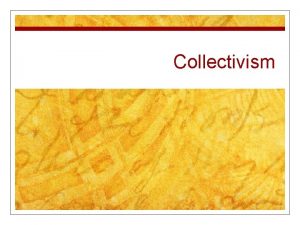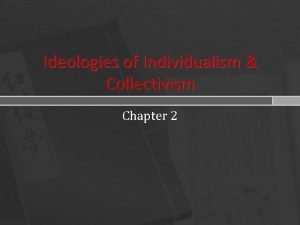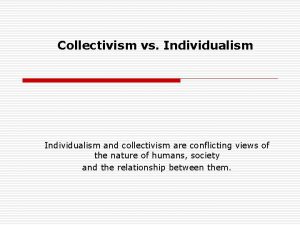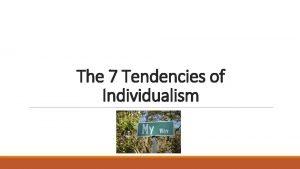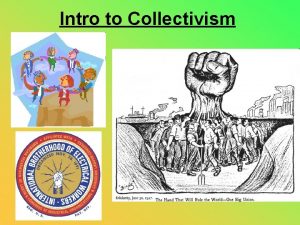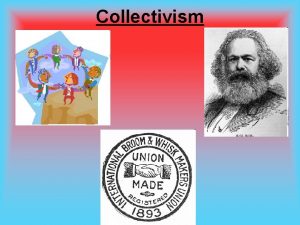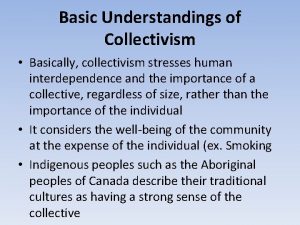Western Culture vs Chinese Culture Individualism vs Collectivism











- Slides: 11

Western Culture vs Chinese Culture

Individualism vs Collectivism Western culture: • Good to stand out from the crowd • Make your own way Chinese culture: • Good to fit in with the crowd • Support the whole group

Honour and Shame Chinese culture: • Concept of honour or ‘face’ very important • Not just about individual, affects your circle • Saving face more important than honesty Western culture: • Socially acceptable to embarrass self or others • Your reputation is personal, doesn’t affect others • Honesty valued even if truth is embarrassing

Family Chinese culture • Adults live with parents & grandparents • Hierarchical structure, elders obeyed • Elderly cared for by their children Western culture • Adults move away from parents • Parents respected, but younger generation goes their own way • Elderly live in care homes

Work & Study Chinese culture: • Memorise information • High pressure • Never question superiors, disrespectful • Work very long hours to show dedication Western culture: • Problem solving, creativity • Lower pressure • Questioning encouraged • Work hours 9 -5 pm

Privacy Chinese culture: • Normal to ask personal questions • Don’t publicly display or voice affection, show love through care • Keep emotions hidden, keep face neutral Western culture: • Impolite to ask personal questions • Display affection in public, verbally express love • Express feelings and emotions freely, show on face

Food Western culture: • Each person gets their own plate of food with a serving just for them • Presentation important Chinese culture: • Dishes are placed in the middle, everyone shares • Presentation important

Love and marriage Chinese Culture • Arranged marriages cultural norm until fairly recently • Young people often still pressured to marry someone chosen by parents • Strong expectation to marry before certain age Western Culture • Arranged marriages died out in 17 th century • Marriage based on love/choice, not practical considerations • Some expectation that people get married, but fading out

Humour Western Culture • Humour part of normal interactions • Very few things can’t be joked about • Self-deprecating humour is good Chinese Culture • Humour only acceptable in certain contexts • Serious topics should not be joked about • Laughing at yourself or others lowers status/face

Money Western culture • If you have money, spend it and show off expensive things • Ambition is a personal choice Chinese culture • If you have money, save it, don’t flash wealth • Ambition is expected

Traditional gender roles Western Culture • Women’s role = domestic duties, care for children • Men’s role = work, provide, fight in wars • Socially unacceptable to choose a different role, even if unsuited. • This changed after feminist movement Chinese Culture • Similar – Confucius taught strict adherence to roles would ensure social harmony. Everyone should know their place. “Men plough, women weave”. • Men & women = yin & yang • China also had feminist movement during Communist Revolution
 Primary 3 malay worksheets
Primary 3 malay worksheets The theory and practice of oligarchical collectivism
The theory and practice of oligarchical collectivism Oligarchical collectivism definition
Oligarchical collectivism definition Individualistic culture vs. collectivist culture
Individualistic culture vs. collectivist culture Economic equality
Economic equality United states collectivism
United states collectivism Oligarchical collectivism
Oligarchical collectivism Oligarchical collectivism
Oligarchical collectivism Collectivist or individualist
Collectivist or individualist Public property collectivism
Public property collectivism Socialism vs collectivism
Socialism vs collectivism Lawrence kohlberg moral development
Lawrence kohlberg moral development




